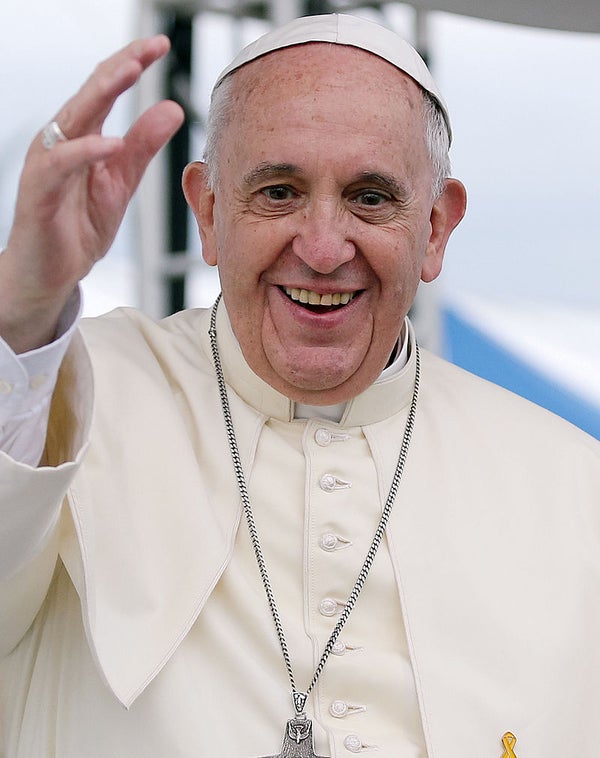This article was published in Scientific American’s former blog network and reflects the views of the author, not necessarily those of Scientific American
On this blog, I often bemoan the lack of influential figures challenging U.S. militarism. (See my last post on the Pentagon and Silicon Valley.) Many people around the world view the U.S. as “the greatest threat to peace,” as a recent poll put it, and with good reason. The U.S. spends almost as much as all other nations combined on “defense,” and the wars it has waged since 9/11 have killed more than 370,000 people, including 210,000 civilians.
A few prominent figures have faulted the U.S., at least implicitly, for impeding peace. One is Pope Francis, who is touring the United States this week. Last spring the Pope said:
“Why do so many powerful people not want peace? Because they live off war, the arms industry is a serious matter! The powerful earn a living by producing and selling arms to countries: it is the industry of death, they make money from it. You know greed is really bad for us, our desire to have more, more money: and when we see that everything revolves around money, that the economic system revolves around money and not around people, around men and women, a great deal is sacrificed and people go to war to defend money. This is why so many people do not want peace: you profit more from war and money but you lose lives, culture, education, you lose so many things. An elderly priest I met some years ago, used to say: the devil enters through people’s wallets, through greed and this is why they do not want peace.”
On supporting science journalism
If you're enjoying this article, consider supporting our award-winning journalism by subscribing. By purchasing a subscription you are helping to ensure the future of impactful stories about the discoveries and ideas shaping our world today.
The Pope did not explicitly mention the U.S. But he surely knows that the U.S. is the world’s dominant manufacturer and dealer of arms. According to the Stockholm International Peace Research Institute, five of the top six weapons firms are U.S.-based (the other is British).
Former U.S. President Jimmy Carter has criticized U.S. militarism more explicitly. In 2012, Carter was a guest on a radio show hosted by Brian Lehrer. Lehrer, who had previously had me on as a guest, asked Carter about my prediction that war might end. Here is their exchange:
Brian Lehrer: We’re doing a program on the end of war based on a book of that title by science writer John Horgan. He argues that just as humanity turned slavery and human sacrifice from acceptable institutions into unacceptable ones, that war could be made culturally unacceptable around the world with the right effort over time. So we’re asking many of our guests, Do you think human beings can ever abolish war? Do you?
Jimmy Carter: Yes I think that's certainly true, certainly a future prayer to extend. I think that a lot of people felt that might be the case in 1945 when we organized the United Nations, that that would be the end of war. But we know that it isn’t. I think that this is something we should do. I wrote a book a number of years ago called Talking Peace, where I described the causes of conflict and how we can resolve issues peacefully. Even the most intense disagreements and even the most intense personal animosities between two people or two nations can be resolved through the application of Christian principles and with the help of a trusted mediator, a councilor in a church or a mediator. I played a small role between Egypt and Israel. But I think it's certainly a possibility. But nowadays unfortunately, my wife and I have been to more than 130 countries and now we travel around doing work for the Carter Center, and it's generally accepted that the most intense warmonger for the last 35 or 40 years has been the United States of America. We're the country that's in the forefront of almost every war that's started. And when you go into Brazil, when you go into China, into Egypt and so forth, you find countries that haven't been to war in the last 30 years or more… We have grandchildren who have never lived in a country that was not at war.
Brian Lehrer: Warmonger is a tough word to describe your own country.
Jimmy Carter: I was quoting other people. But our country is in the forefront of those nations that are eager to go to war to resolve differences. We've proven that, as you know, in a number of cases for a long time. When we went into Korea, when we went into Vietnam, when we went into Iraq both times. I think all those wars were unnecessary.
We need more leaders in U.S. government, industry and academia to speak out with the moral courage displayed by President Carter and Pope Francis. The world as a whole has become much less warlike since the end of World War II. If the U.S. can overcome its current hawkishness, which harms Americans as well as others, it could lead humanity to an enduring peace.
Further Reading:
War Is Our Most Urgent Problem. Let’s Solve It.
Would Global Violence Decline Faster If U.S. Was Less Militaristic?
Neil deGrasse Tyson, Please Speak Out about Militarization of Science!
We Need a New Just-War Theory, Which Aims to End War Forever.
Lets Begin Talking About How to End Wars.
Should Scientists and Engineers Resist Taking Military Money?
